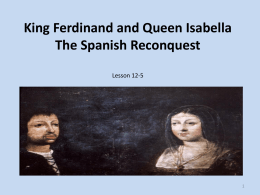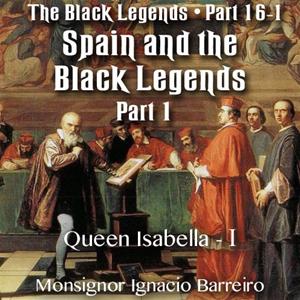November 26, was her feast day.
The return of Christopher Columbus; his audience before King Ferdinand and Queen Isabella.
Isabella I (Spanish: Isabel, 22 April 1451 – 26 November 1504) reigned as Queen of Castile from 1474 until her death. Her marriage to Ferdinand II of Aragon became the basis for the political unification of Spain under their grandson, Charles I. After a struggle to claim her right to the throne, she reorganized the governmental system, brought the crime rate to the lowest it had been in years, and unburdened the kingdom of the enormous debt her brother had left behind.
 Her reforms and those she made with her husband had an influence that extended well beyond the borders of their united kingdoms. Isabella and Ferdinand are known for completing the Reconquista, ordering conversion or exile of their Muslim and Jewish subjects, and for supporting and financing Christopher Columbus's 1492 voyage that led to the opening of the New World and to the establishment of Spain as the first global power which dominated Europe and much of the world for more than a century. Isabella, granted together with her husband the title "the Catholic" by Pope Alexander VI, was recognized as a Servant of God by the Catholic Church in 1974.-Wikipedoa
Her reforms and those she made with her husband had an influence that extended well beyond the borders of their united kingdoms. Isabella and Ferdinand are known for completing the Reconquista, ordering conversion or exile of their Muslim and Jewish subjects, and for supporting and financing Christopher Columbus's 1492 voyage that led to the opening of the New World and to the establishment of Spain as the first global power which dominated Europe and much of the world for more than a century. Isabella, granted together with her husband the title "the Catholic" by Pope Alexander VI, was recognized as a Servant of God by the Catholic Church in 1974.-Wikipedoa
Spain's Black Legend

The Black Legend against Spain is part of a vast movement started by the enemies of the Faith to destroy the Catholic religion. It is not an isolated case; other Catholic countries like Italy, Ireland and Poland have had their reputations smeared for their adhesion to the Faith. The Black Legend seeks to throw discredit upon the Faith by building biases and prejudices against Catholicism. A current example of these attacks is Dan Brown's book The Da Vinci Code, a malevolent cocktail of fake scholarship, lies and half-truths. It seeks to instill in Catholics a sense of embarrassment and shame about the way in which their ancestors lived and practiced their faith. The effect is subtle but too often ends by Catholics then doubting the truth of the Faith.
The Black Legend was fanned largely by Protestant and liberal ideology and, particularly in the twentieth century, the Marxist re-interpretation of history. Even in Latin America, the influence of the so-called "Enlightenment" movement (largely directed against the Catholic faith) led to a type of Black Legend that was used to justify the aspirations of political independence from Spain. In that region political "adulthood" in the early nineteenth century was grounded in a rationalist ideology that repudiated the Hispanic heritage.1 Regrettably, even today many priests and religious of the Church have accepted totally or partially the Black Legend against Spain. They have led protest movements against the celebrations of the Fifth Centennial observing the discovery and conquest of America. They evidently believe it would have been preferable to leave the indigenous paganism with its idolatrous and bloody cults undisturbed and without the preaching of the Gospel.
The Black Legend is "an atmosphere created by the fanatic accounts of Spain which have been published in almost all countries; grotesque descriptions which are constantly being made of the character of Spaniards as individuals and collectively; the negation, or at least, the systematic ignorance of whatever is favorable and worthy of honor in the various manifestations of culture and art; the accusations which are always being launched against Spain are based upon events which are exaggerated, badly interpreted, or totally false."2 This has created all sorts of negative stereotypes that have been reinforced by the media — particularly Hollywood. It is useful to consider those aspects of the history of Spain that have been the focus of the Black Legend.
The Reconquest
The efforts of Christians in Spain to free themselves from Islamic domination (which began in the eighth century) have been denounced and distorted by revisionist liberal historians. Some have stated that both the Crusades in the Holy Land and the reconquest in Spain were anti-Christian because they entailed the propagation of religious faith by the violence of arms. That is a total misstatement of the facts, since those wars were not meant to convert anyone by force, but rather to recover lands that had been unjustly taken over by Muslims. The Spaniards were engaged in a crusade, which is a just war in which the participants receive spiritual benefits, a war sanctioned by ecclesiastical authority that granted remission of sins to those taking part in it. The different Spanish Kingdoms had indeed a right and obligation to recover the lands that had been unjustly taken by the Arab invaders.
Continued
https://www.catholicculture.org/culture/library/view.cfm?recnum=6625
Spain and the Black Legends - Part 01 - Queen Isabella- I
SKU: 3371D-01
Monsignor Ignacio Barreiro begins his discussion of the Black Legends with two talks on the savaging of the reputation of Queen Isabella of Spain. Her deep spirituality and association with reformers like the great Cardinal Ximenez are examined. Taken from: The Black Legends: The Renaissance, the Enlightenment, and the Anti-Catholic Myth - 2003 VonHildebrand Institute
https://store.keepthefaith.org/spain-and-the-black-legends---part-1-of-4---queen-isabella---i







No comments:
Post a Comment